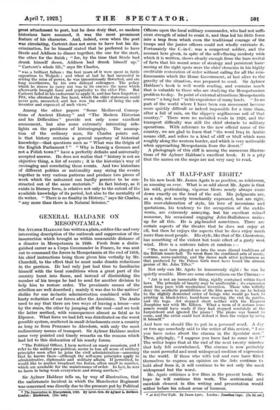AT HALF-PAST EIGHT.*
IN his new book Mr. James Agate is as positive, as roisterous, as amusing as ever. What is so odd about Mr. Agate is that his wild, gesticulating, vigorous blows nearly always come down exactly on the head of the nail. His judgments are, as a rule, not merely trenchantly expressed, but are right. His over-elaboration of style, his love of inversions and quotations, his tendency to the occupation of the caddis worm, are extremely annoying, but his excellent robust nonsense, his occasional engaging John-Bullishness makes up for all this. He is pig-headed sometimes. There are certain aspects of the theatre that he does not enjoy at all, but then he enjoys the aspects that he does enjoy much more than most people. His style, like that of Mr. Chesterton, has something of the violent but tonic effect of a gusty west wind. Here is a sentence taken at random :— " The next turn plunged us into the more dismal traditions of the British music-hall. To wrest from the combined arts of music, costume, scene-painting, and the dance such utter joylessness as that produced by the Palace Girls must have taxed the utmost genius of Mr. John Tiller."
Not only can Mr. Agate be humorously right : he can be quietly sensible. Here are some observations on the Cinema :— "Art is not an immutable thing, rigidly contained within fixed laws. The principle of beauty may unalterable; be unalteble ; its expression must keep pace with mechanical invention. Those who wilfully deny the aesthetic possibilities of the film seem to me to belong to the slightly demented order of beings who would go back to printing in black-letter, hand-loom weaving, the viol da gamba, and the toga. Art stopped short neither with the Empress Josephine nor with Mr. Edison. What a mess of it serious com- posers would have made if they had stopped resolutely at the harpsichord and ignored the piano I The piano was bound to come, and the artist could best defend it from the vulgar by using it himself."
And here we should like to put in a personal word. A day or two ago somebody said to the writer of this review, "I see you have notes about the cinema in the Spectator now." Then, pityingly, "I suppose you have had to come to it ! " The writer hopes that at the end of the next twenty minutes that lady felt overwhelmed. The cinema is now probably the most powerful and most widespread medium of expression in the world. If those who with toil and care have fitted themselves to express an opinion on the Arts continue to hold aloof from it, it will continue to be not only the most widespread but the worst.
Mr. Agate criticizes a few films in the present book. We hope he will continue this work. The sentimental and mawkish element in film writing and presentation would wither before his robust sense of humour.
• at Hati-Past Eight. By James Agate. London; Jonathan Cape. ra. tid.










































 Previous page
Previous page